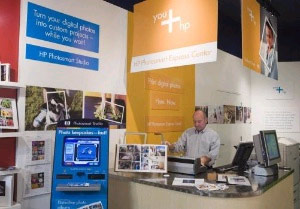Article
HP enters photo kiosk market
Photo kiosks are one of the great self-service success stories - and computing giant HP wants a piece of the action. The company recently unveiled two ambitious new models that emphasize speed and print quality.
March 12, 2006 by James Bickers — Editor, Networld Alliance
With some two-dozen companies actively involved in designing, manufacturing and selling photo kiosks, any new competitor on this scene must surely hope that "better late than never" is true. And when the field is filled with titans like Kodak, which has an estimated 75,000 photo kiosks deployed worldwide, the new arrival must bring something special to the table.
Palo Alto, Calif.-based HP believes it has something very special and is making its move to dominate in the retail space the way it has in the home printing market.
Last month, the company unveiled two photo kiosks, the Photosmart Express and Photosmart Studio. The former is a standalone unit that only produces 4x6 prints, but very quickly; the latter connects to a larger behind-the-counter system for one-hour service.
"It really comes down to following where the customer wants to go," said Kalle Marsal, director of marketing for HP's retail photo solutions group. "We see the same customer having the need to do photo printing and activities in the home, online and at retail, depending on the situation and depending on the day. It was pretty clear to us that we needed to have a strong offering in the retail photo space if we wanted to be the leader in photo."
Marsal said the announcement is part of a bigger-picture plan that also includes the acquisition of Snapfish, the leading online photo processing service.
"Digital photography has been elevated to one of the highest priority objectives for the company," he said. "This really is just the first step."
Under the hood
Marsal called the Photosmart's printing capabilities "fourth-generation inkjet," part of a five-year, $1.4 billion investment in technology. The machine's print heads have more than 30,000 nozzles, which he said translates to a speed of one billion droplets of ink per second. "We're able to print very high quality prints at speeds that have not been possible before."

For Photosmart Express, the decision was made to craft a device that does one thing, but does it well: in this case, 4x6 prints. HP estimates it can churn out photos at a rate of one every five seconds.
The Studio model answers the need for larger sized prints, as well as the growing demand for alternative photoproducts like calendars, greeting cards and posters.
Estimated prices range from $15,000 for the Express to $50,000 for the Studio, with variances based on configuration. Marsal said HP would not disclose the companies that helped develop the kiosks, but did say there were "several partners on both the hardware and software sides."
Keep it simple
As a globetrotting, respected voice-of-authority on photo kiosks, Francie Mendelsohn is a tough customer. The president of Summit Research Associates, Mendelsohn has probably tested every major photo kiosk in use today. And she doesn't mince words when it comes to usability; designers hold their breath when she puts one of their machines through its paces.
She admits she was skeptical about HP's latest endeavor. "My first reaction was, why are they entering a market that is saturated?" she said. "But having seen it, I think they're going to do very well."
Mendelsohn heaped particular praise on the Photosmart's attract loop, which she called "the cleverest thing I've ever seen." While idle, the machine rotates through a series of humorous, lighthearted messages designed to put the potential customer at ease: "Touch my screen - I won't bite." "You can crop and zoom, like ex-boyfriends." "Touch my screen to begin - careful, I'm ticklish."
"Nobody else can do this now because they'll be accused of copying, but I've never seen anything like it," she said.
|
"It's very clean, very intuitive," Mendelsohn said of the device she tested at the annual PMA show in Orlando, Fla. "They kept apologizing, saying `Oh, this is just a prototype, it's going to be faster,' and I kept saying, `You don't have to apologize! This thing is good!'"
She said the designers made the wise move of keeping screens uncluttered and minimizing options. While the machine is working, the screen gives tips on how to take better pictures. And when printing begins, a countdown timer estimates how much longer the user will have to wait to get the finished product.
"Before, I would have told them they were wasting their time," she said. "Now that I've seen what they've come up with, I think they will be a serious competitor."
Getting into the real world
Many self-service devices work great in the test lab, but getting them out where customers can use them is as much of a challenge as development. This is particularly true in an established niche like retail photo, where the dominant players have had years to carve out their foothold.
HP initially announced that the Photosmart line would debut in Albertson's, Longs Drugs Stores and specialty shops like Dan's Camera City in Allentown, Pa. But the bigger news came Feb. 27, when the company announced a deal to place the Photosmart Studio in 50 Wal-Mart and SAM's CLUB Stores nationwide. Even though that's a fractional number of locations in those two chains, it does represent a serious foot in the door with the mother of all mega-retailers.
"The market timing is right," Marsal said. "The mass market is really adopting digital photography now, and they're looking for easier solutions. Digital printing in retail has been growing for some time, but it's exploding this year."











